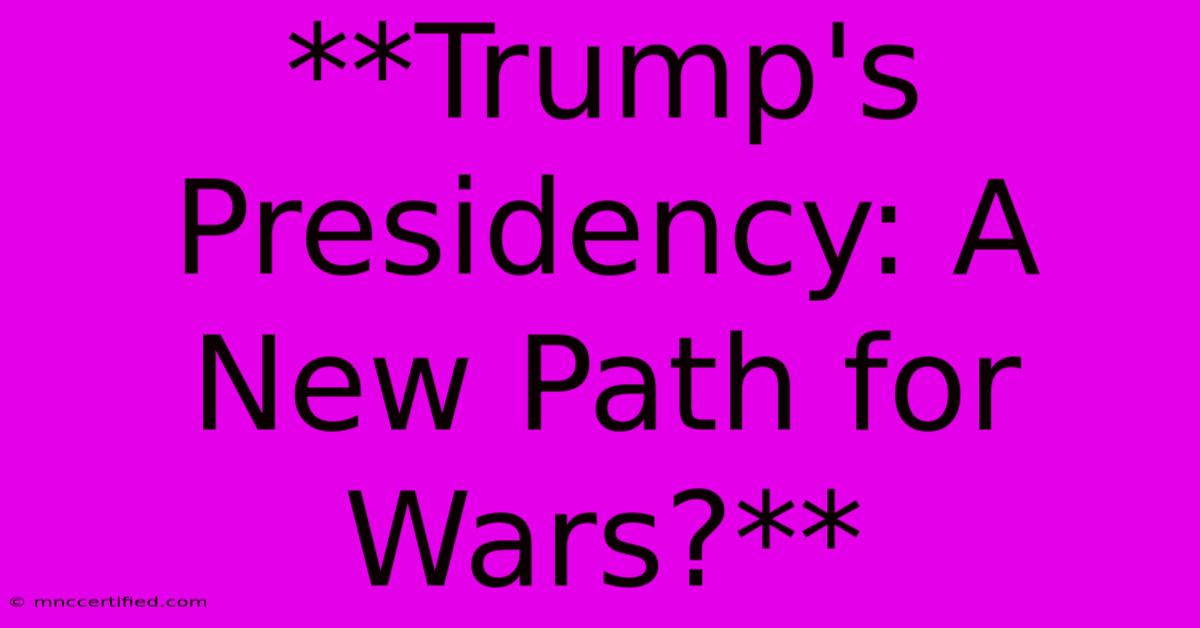**Trump's Presidency: A New Path For Wars?**

Table of Contents
Trump's Presidency: A New Path for Wars?
The presidency of Donald Trump marked a significant shift in US foreign policy, particularly in the realm of warfare. His "America First" doctrine, coupled with his unorthodox approach to international relations, led to a complex and often contradictory landscape in terms of US military engagement. This article explores the defining characteristics of Trump's foreign policy approach to war and its lasting impact on the world stage.
From "America First" to Military Action: A Complex Narrative
Trump's campaign rhetoric emphasized isolationism and a reduction in foreign entanglements. However, his presidency saw an increase in military spending and the continuation of US involvement in various conflicts. This seemingly contradictory approach can be understood through the lens of his "America First" policy, which prioritized US interests above all else.
Here are some key features of Trump's approach to war:
- Increased Military Spending: Trump significantly increased the US military budget, arguing that a strong military was essential for national security and the protection of American interests.
- Unconventional Diplomacy: Trump often bypassed traditional diplomatic channels and engaged in direct negotiations with foreign leaders, sometimes through unconventional methods like Twitter.
- Emphasis on Bilateral Deals: Trump prioritized bilateral deals over multilateral agreements, often emphasizing the need to "make America great again" through economic and military superiority.
- Withdrawal from International Agreements: Trump withdrew the US from several international agreements, including the Paris Agreement on climate change and the Iran nuclear deal, arguing that these agreements were detrimental to American interests.
Examining Key Conflicts During Trump's Presidency
The Middle East:
- The Syrian Civil War: Trump authorized a limited airstrike against the Syrian government in response to a chemical weapons attack but largely maintained a hands-off approach, allowing Russia and Iran to exert increasing influence in the region.
- The Iran Nuclear Deal: Trump withdrew the US from the Iran nuclear deal, arguing that it was not in America's best interest. This action led to increased tensions with Iran and a series of retaliatory actions.
- The War in Yemen: Trump continued US military support for the Saudi-led coalition in Yemen, despite concerns about civilian casualties and potential war crimes.
The Korean Peninsula:
- North Korea: Trump engaged in a series of high-profile summits with North Korean leader Kim Jong-un, aiming to achieve a denuclearization deal. However, these efforts proved unsuccessful, and tensions remained high.
Other Conflicts:
- The War in Afghanistan: Trump authorized a troop surge in Afghanistan, but also initiated negotiations with the Taliban, ultimately culminating in the withdrawal of US troops.
- The War in Iraq: Trump continued US military involvement in Iraq, primarily in the fight against ISIS, but also oversaw the withdrawal of US troops from the country.
Assessing the Legacy of Trump's Approach to War
Trump's approach to war was undeniably disruptive, leaving behind a mixed legacy. While his "America First" policy championed US national interests, it often came at the expense of traditional alliances and international cooperation. His reliance on bilateral deals and unconventional diplomacy sometimes led to short-term gains but also created long-term uncertainty and instability.
Some argue that Trump's approach ultimately weakened US credibility and influence on the world stage. The withdrawal from the Iran nuclear deal, for example, raised questions about US reliability as a diplomatic partner. The erratic nature of his diplomacy also led to concerns about the potential for unintended escalation in conflicts.
Others contend that Trump's actions were necessary to reassert US power and prioritize national interests. His increased military spending and focus on bilateral deals, they argue, helped to strengthen the US position in the world.
Ultimately, the impact of Trump's foreign policy approach to war remains a matter of ongoing debate. However, there is no doubt that his presidency marked a significant departure from previous US administrations and will continue to shape the global landscape for years to come.
Moving Forward: The Future of US War Policy
The next chapter in US foreign policy remains uncertain, but it is clear that the Trump presidency has left a lasting impact. Whether future administrations will continue with his "America First" approach or return to a more traditional form of multilateralism remains to be seen. One thing is certain: the challenges of war and conflict will continue to demand careful consideration and a thoughtful approach from the US and its international partners.
Further Reading:
- "The Art of the Deal: The Trump Presidency and the World" by Richard Haass
- "Fire and Fury: Inside the Trump White House" by Michael Wolff
- "Trump and the Art of the Deal: The President's Strategies and Tactics" by Peter Schweizer
Keywords: Trump presidency, foreign policy, war, military, America First, diplomacy, international relations, Syria, Iran, North Korea, Afghanistan, Iraq, Middle East, Korean Peninsula, legacy, impact, future, US, global, international.

Thank you for visiting our website wich cover about **Trump's Presidency: A New Path For Wars?**. We hope the information provided has been useful to you. Feel free to contact us if you have any questions or need further assistance. See you next time and dont miss to bookmark.
Featured Posts
-
Handmaids Tale 1984 See Sales Spike
Nov 07, 2024
-
Savannah Bond Luna Star Yw7ljp41 Onlyfans
Nov 07, 2024
-
Visions Federal Credit Union Car Insurance
Nov 07, 2024
-
Trevor Sorbies Bowel Cancer Statement
Nov 07, 2024
-
48 Million Profit Polymarket Whales Trump Bet
Nov 07, 2024